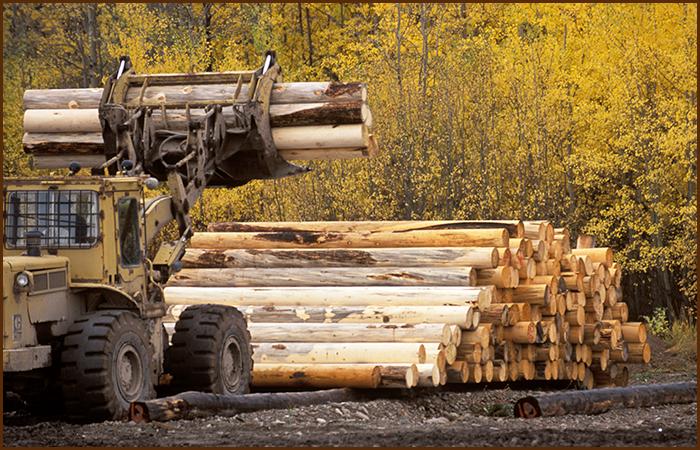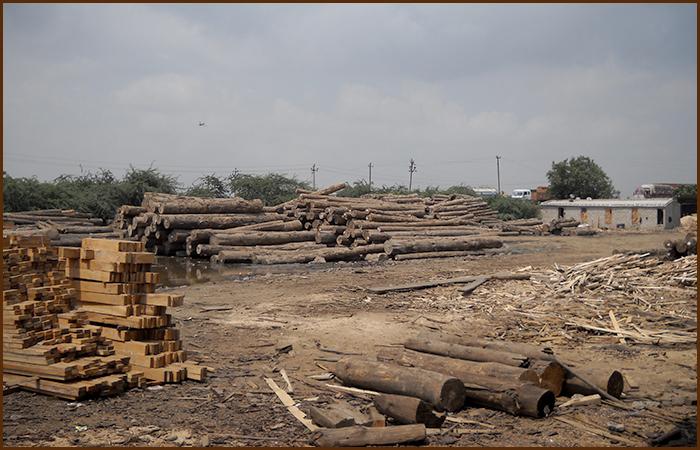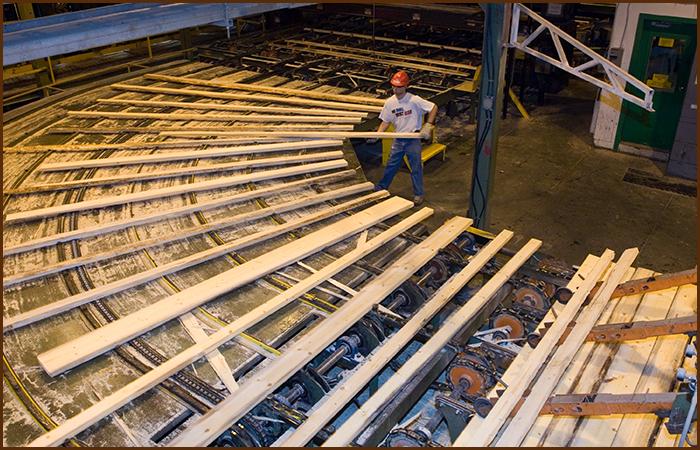Lumber is wood material that has been rough sawn and cut to length, typically in standard increments, whereas logs refers to rough stock wood that hasn't been shaped or processed.
India has traditionally used tropical hardwoods to manufacture wooden products such as furniture, paneling, doors etc. Most hardwoods are either imported or available in India in the form of logs. Coniferous wood coming from western regions of the world like British Columbia (B.C.), Canada are available in the form of sawn lumber which conform to standard grades, come in standard sizes and are kiln-dried (KD) & heat treated (HT) ready to use. Moreover these wood products are certified for sustainability by PEFC/FSC.
In recent times, a new trend is fast emerging in India- furniture manufacturers are increasingly opting for ready sawn lumber over logs.
We researched the market, speaking to large scale manufacturers of furniture around the country to understand what really is boosting this trend.
Here is what we found.




 Furniture manufacturers can look forward to a number of benefits by switching to lumber over logs. Canadian Wood species like western hemlock, western red cedar, douglas fir and spruce-pine-fir offer immense versatility, high durability and workability- qualities that are essential for producing high quality furniture. Explore our species to understand their unique attributes and resultant advantages on our blog here.
Canadian Wood is exhibiting at DelhiWood 2017 between 1 - 4 March 2017, where you can interact with wood experts and representatives from Canadian lumber companies. Visit us at Booth B201. Hall no. 12.
Want to use Canadian Wood lumber for your next project? Write to us here for an immediate response.
FII India, funded by the government of British Columbia (B.C.), Canada represents Canadian wood in India for all its five species viz. Western Hemlock, Douglas Fir, Yellow Cedar, Western Red Cedar and Spruce-Pine-Fir (SPF). FII works closely with architects, manufacturers, importers and real estate developers to provide technical and procurement assistance for their requirements free of any cost.
Furniture manufacturers can look forward to a number of benefits by switching to lumber over logs. Canadian Wood species like western hemlock, western red cedar, douglas fir and spruce-pine-fir offer immense versatility, high durability and workability- qualities that are essential for producing high quality furniture. Explore our species to understand their unique attributes and resultant advantages on our blog here.
Canadian Wood is exhibiting at DelhiWood 2017 between 1 - 4 March 2017, where you can interact with wood experts and representatives from Canadian lumber companies. Visit us at Booth B201. Hall no. 12.
Want to use Canadian Wood lumber for your next project? Write to us here for an immediate response.
FII India, funded by the government of British Columbia (B.C.), Canada represents Canadian wood in India for all its five species viz. Western Hemlock, Douglas Fir, Yellow Cedar, Western Red Cedar and Spruce-Pine-Fir (SPF). FII works closely with architects, manufacturers, importers and real estate developers to provide technical and procurement assistance for their requirements free of any cost.
Reason # 1: Debarking
Logs usually come in a raw form with the bark still on. Debarking is a cumbersome process that consumes a lot of time and effort adding nothing to the manufacturing process. By contrast, sawn lumber is ready-to-use making the production process efficient.
Reason # 2: Cutting & Wastage
Before production, logs need to be converted to lumber. This means additional effort required for cutting wood to size, dealing with irregularities and the resultant wastage from the process. Sawn lumber on the other hand is processed in state-of- art facilities, which are focused on this process alone. The lumber companies usually work as a part of a well By choosing lumber, manufacturers are saved from the added hassles of dealing with these aspects of the process.
Reason # 3: Quality
When it comes to hardwoods, there are no proper systems and facilities in place for kiln drying, heat treatment or for standardization of grades. These critical properties determine the quality of the final product and lack of an established quality yardstick means a lot of uncertainty and added hassles of quality management at the raw material stage. As lumber usually comes in standardized grades and sizes and are heat treated and kiln dried in scientific facilities, manufacturers are assured of consistent quality at all times. Guidelines set by independent agencies such as NLGA and R-list ensure standardized grading throughout the world.
Reason # 4: Certified products
The Indian consumer is slowly becoming aware and conscious of the need to use sustainable, environmentally friendly products in their lives. Many countries around the world have strict criteria for imports and demand products made only from certified wood. Certified lumber gives buyers the confidence that furniture products produced from it are truly compliant.
Reason # 5: Ability to control budgets
Graded wood offers manufacturers flexibility to adjust their budgets by using lower grade wood and using techniques like finger joining to achieve a clear look. Similarly, they can use knotty wood to create furniture for a more rustic appeal. These features offer greater control over the budget as compared to logs. Furniture manufacturers can look forward to a number of benefits by switching to lumber over logs. Canadian Wood species like western hemlock, western red cedar, douglas fir and spruce-pine-fir offer immense versatility, high durability and workability- qualities that are essential for producing high quality furniture. Explore our species to understand their unique attributes and resultant advantages on our blog here.
Canadian Wood is exhibiting at DelhiWood 2017 between 1 - 4 March 2017, where you can interact with wood experts and representatives from Canadian lumber companies. Visit us at Booth B201. Hall no. 12.
Want to use Canadian Wood lumber for your next project? Write to us here for an immediate response.
FII India, funded by the government of British Columbia (B.C.), Canada represents Canadian wood in India for all its five species viz. Western Hemlock, Douglas Fir, Yellow Cedar, Western Red Cedar and Spruce-Pine-Fir (SPF). FII works closely with architects, manufacturers, importers and real estate developers to provide technical and procurement assistance for their requirements free of any cost.
Furniture manufacturers can look forward to a number of benefits by switching to lumber over logs. Canadian Wood species like western hemlock, western red cedar, douglas fir and spruce-pine-fir offer immense versatility, high durability and workability- qualities that are essential for producing high quality furniture. Explore our species to understand their unique attributes and resultant advantages on our blog here.
Canadian Wood is exhibiting at DelhiWood 2017 between 1 - 4 March 2017, where you can interact with wood experts and representatives from Canadian lumber companies. Visit us at Booth B201. Hall no. 12.
Want to use Canadian Wood lumber for your next project? Write to us here for an immediate response.
FII India, funded by the government of British Columbia (B.C.), Canada represents Canadian wood in India for all its five species viz. Western Hemlock, Douglas Fir, Yellow Cedar, Western Red Cedar and Spruce-Pine-Fir (SPF). FII works closely with architects, manufacturers, importers and real estate developers to provide technical and procurement assistance for their requirements free of any cost.


